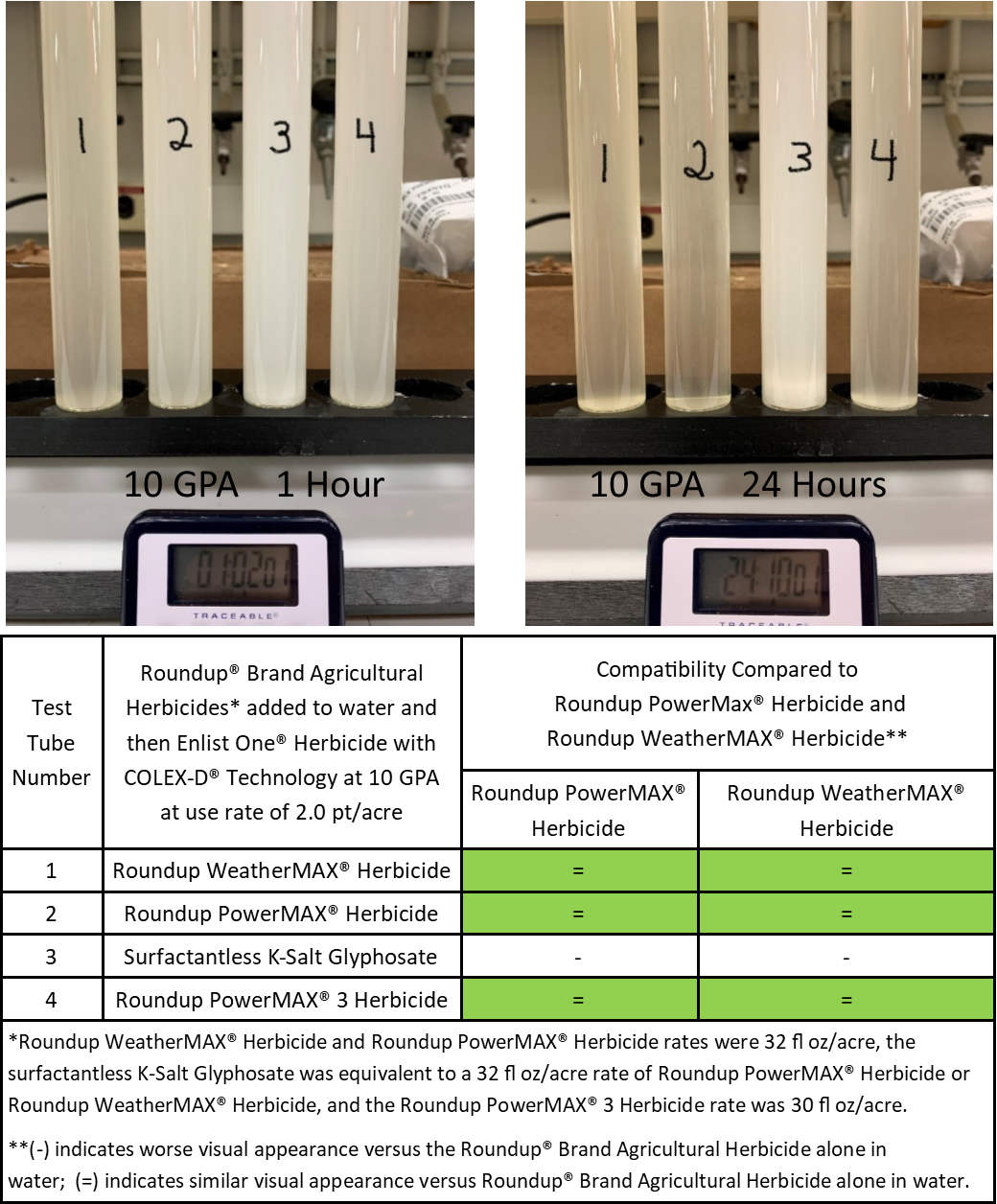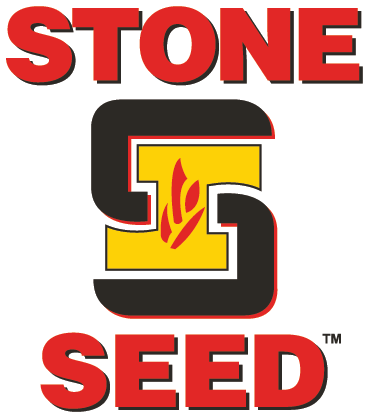Successful herbicide applications start with reading the respective labels for herbicides and any additives and following the prescribed recommendations. Among many items, the prescribed recommendations include safety precautions, the mixing order for herbicides and additives, correct nozzle selection, spray pressure, gallons per acre (GPA), application ground speed, correct boom height, and acceptable environmental conditions for an application.
Following the proper mixing order for multiple products can help prevent incompatibility which can result in the spray mix becoming solidified, having reduced efficacy, or having an increased potential for drift. Small proportional quantities of the tank-mix products should be tested for compatibility in an acceptable container (jar test) before beginning to fill the spray tank. Individual tank-mix components should be added in the following order:
- Wettable powders
- Suspension concentrates (flowables)
- Emulsifiable concentrates
- Drift reduction additives
- Water-soluble liquids
- Surfactants
Tank-filling process for Roundup® brand glyphosate-only agricultural herbicides:
PRODUCTS SHOULD BE ADDED INDIVIDUALLY TO WATER AND ALLOWED TO BE FULLY MIXED PRIOR TO ADDING ANOTHER PRODUCT!
- Place a 20- to 35-mesh screen or wetting basket over the filling port of the tank and add all liquid components, including water, through the screen.
- Fill the tank 1/2 full of water and start gentle agitation. Agitation should be ongoing.
- Add ammonium sulfate (AMS). If dry AMS is used, it should be completely dissolved in the tank before adding other components.
- If a wettable powder is used, prepare a slurry of it with water and add it SLOWLY through the screen.
- If a suspension concentrate (flowable) formulation is used, premix one part flowable with one-part water and add the diluted mixture SLOWLY through the screen.
- If an emulsifiable concentrate formulation is used, premix one part emulsifiable concentrate with two parts water and add the diluted mixture SLOWLY through the screen.
- Continue filling the tank with water and add water-soluble liquids such as Roundup WeatherMAX® herbicide, Roundup PowerMAX® herbicide, Roundup PowerMAX® 3 herbicide. After the Roundup® brand glyphosate-only agricultural product selected is fully mixed, 2,4-D products can be added.
- If needed, add nonionic surfactants before completing the filling process.
Roundup® brand glyphosate-only agricultural herbicides are approved for use with ENLIST E3® soybeans. As instructed above, proper mixing order must be followed.
The recommended water carrier volume with Roundup® brand glyphosate-only agricultural herbicides and Enlist One® herbicide with COLEX-D® technology is 10 to 15 GPA.
Do not pour Roundup® brand glyphosate-only herbicides into the spray tank at the same time as Enlist One® herbicide with COLEX-D® technology, and do not allow concentrated glyphosate and 2,4-D to come into contact with each other. It is recommended to add each product individually to water with enough time for complete mixing before an additional product is added to the tank. Salting out can occur if products are added at the same time without ample water and agitation.
Glyphosate is a weak acid herbicide that becomes a salt when it comes into contact with a base compound. Several glyphosate salts are commercially available including potassium (K-Salt), dimethalamine (DMA), and isopropylamine (IPA). A major difference between these salts and glyphosate herbicides is the active ingredient concentration. K-Salt products typically have a higher active ingredient concentration; therefore, it contains less water and more active ingredient within a specified volume of herbicide. Roundup® brand glyphosate-only agricultural herbicides are K-Salt products.
Bayer® laboratory compatibility tests demonstrated the compatibility of Roundup® brand glyphosate-only agricultural herbicides with Enlist One® herbicide with COLEX-D® technology. Two simulated tank-mix studies were completed to evaluate the compatibility of different Roundup® brand glyphosate-based agricultural chemicals with Enlist One® herbicide with COLEX-D® technology at carrier volumes of 5 and 10 GPA. The Roundup® brand glyphosate-based agricultural chemicals were added to water in the tubes first, and then Enlist One® herbicide with COLEX-D® technology was added.
Nessler test tubes and rack were used for the study with the following sequence:
- 342 ppm World Health Organization (WHO) standard water was added to each Nessler tube.
- The glyphosate product was added to the Nessler tube.
- Each tube was inverted ten times.
- Enlist One® herbicide with COLEX-D® technology was added to each Nessler tube.
- Each tube was inverted ten times.
- Observations were made at time zero, 1 hour, and 24 hours.
- After 24 hours, each tube was inverted multiple times to determine if any precipitate would reincorporate into the bulk liquid.
Figure 1. demonstrates the compatibility of Roundup® brand glyphosate-only agricultural herbicides (labeled as 1, 2, 3, and 4 in Figure 1 below) with Enlist One® herbicide with COLEX-D® technology at a rate of 2.0 pt/acre, a carrier volume of 10 GPA, and at 1 and 24 hours, respectively, compared to Roundup PowerMAX® Herbicide (32 fl oz/acre), Roundup WeatherMAX® Herbicide (32 fl oz/acre), Roundup PowerMAX® 3 Herbicide (30 fl oz/acre) alone. A surfactantless K-Salt glyphosate, at a rate equivalent to 32 fl oz/acre of Roundup PowerMAX® Herbicide or Roundup WeatherMAX® Herbicide, was included in the comparison. The combination of the three Roundup® brand glyphosate-only agricultural herbicides at a 10 GPA dilution demonstrated acceptable dilution compatibility with Enlist One® herbicide with COLEX-D® technology at a rate of 2.0 pt/acre and a carrier volume of 10 GPA.
 Figure 1. Compatibility of Roundup® brand glyphosate-only agricultural herbicides mixed with Enlist One® herbicide with COLEX-D® technology at 10 GPA
Figure 1. Compatibility of Roundup® brand glyphosate-only agricultural herbicides mixed with Enlist One® herbicide with COLEX-D® technology at 10 GPA
Figure 2. demonstrates the poor compatibility of Roundup® brand glyphosate-only agricultural chemicals (labeled as 1, 2, 3, and 4 in Figure 2 below) with Enlist One® herbicide with COLEX-D® Technology at a rate of 2.0 pt/acre, a carrier volume of 5 GPA, and at 1 and 24 hours, respectively, compared to Roundup PowerMAX® Herbicide (32 fl oz/acre), Roundup WeatherMAX® Herbicide (32 fl oz/acre), and Roundup PowerMAX® 3 Herbicide (30 fl oz/acre) alone. A surfactantless K-Salt glyphosate, at a rate equivalent to 32 fl oz/acre of Roundup PowerMAX® Herbicide or Roundup WeatherMAX® Herbicide, was included in the comparison. Each glyphosate-only product, when mixed with Enlist One® herbicide with COLEX-D® technology formed a significant amount of precipitate. Efforts to redisperse or redissolve the precipitate into the bulk liquid (multiple inversions of the tubes) were not successful.
Enlist One® with COLEX-D® technology should not be combined with Roundup® brand glyphosate-only agricultural herbicides at a 5 GPA carrier volume due to significant formation of solid precipitate that could clog herbicide application equipment.
 Figure 2. Compatibility of Roundup® brand glyphosate-only agricultural herbicides mixed with Enlist One® herbicide with COLEX-D® technology at 5 GPA
Figure 2. Compatibility of Roundup® brand glyphosate-only agricultural herbicides mixed with Enlist One® herbicide with COLEX-D® technology at 5 GPA
In conclusion, Roundup WeatherMAX® Herbicide (32 fl oz/acre), Roundup PowerMAX® Herbicide (32 fl oz/acre), and Roundup PowerMAX® 3 Herbicide (30 fl oz/acre) demonstrated acceptable dilution compatibility with Enlist One® herbicide with COLEX-D® technology at a rate of 2.0 pt/acre and a carrier volume of 10 GPA. Further, no distinct differences were observed when focusing on the impact of the order in which the herbicide chemistries were added to water (Enlist One® herbicide with COLEX-D® technology first, then Roundup® brand glyphosate-only agricultural herbicide systems second; or vice-versa).
For additional information, visit https://www.cropscience.bayer.us/products for additional information on Roundup® Brand glyphosate-only agricultural herbicides and visit the Enlist™ weed control system website for tank-mix products approved for Enlist™ herbicides.
Sources:
Ikley, J. 2019. Mixing issues with Enlist One and glyphosate. Crop & Pest Report. North Dakota State University. https://www.ag.ndsu.edu/.
Enlist™ Herbicides Tank-Mix Sequence Procedures. Enlist weed control system. Corteva Agriscience™. https://www.enlist.com/en.
Enlist Herbicides Tank-Mix Sequence Procedures. Enlist weed control system. Corteva Agriscience™ https://www.enlist.com/en.
Web sources verified 08/19/2020.
4003_S8
